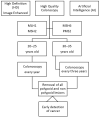The Role of Colonoscopy in the Management of Individuals with Lynch Syndrome: A Narrative Review
- PMID: 37568596
- PMCID: PMC10417258
- DOI: 10.3390/cancers15153780
The Role of Colonoscopy in the Management of Individuals with Lynch Syndrome: A Narrative Review
Abstract
The history of Lynch syndrome changed definitively in 2000, when a study published in Gastroenterology demonstrated a significant reduction in mortality among individuals with Lynch syndrome who undergo regular endoscopic surveillance. As a consequence of this clinical evidence, all scientific societies developed guidelines, which highlighted the role of colonoscopy in the management of Lynch syndrome, especially for individuals at high risk of colorectal cancer. Over the years, these guidelines were modified and updated. Specialized networks were developed in order to standardize endoscopic surveillance programs and evaluate all the clinical data retrieved by the results of colonoscopies performed for both the screening and the surveillance of individuals with Lynch syndrome. Recent data show that the impact of colonoscopy (with polypectomy) on the prevention of colorectal cancer in individuals with Lynch syndrome is less significant than previously thought. This narrative review summarizes the current discussion, the hypotheses elaborated and the algorithms depicted for the management of individuals with Lynch Syndrome on the basis of the recent data published in the literature.
Keywords: Lynch syndrome; colonoscopy; colorectal cancer; incident cancer risk; mismatch-repair deficiency; surveillance.
Conflict of interest statement
Valentina D’Angelo (V.D.A.), Daniela Rega (D.R.), Pietro Marone (P.M.), Elena Di Girolamo (E.D.G.), Corrado Civiletti (C.C.), Fabiana Tatangelo (F.T.), Francesca Duraturo (F.D.), Marina De Rosa (M.D.R.), Mario de Bellis (M.d.B.), and Paolo Delrio (P.D.) have nothing to disclose regarding financial and personal relationships with other people or organizations, even if these do not directly relate to the submitted work.
Figures
References
-
- Bhattacharya P., McHugh T.W. Lynch Syndrome. StatPearls Publishing; St. Petersburg, FL, USA: 2022. - PubMed
-
- Järvinen H.J., Aarnio M., Mustonen H., Aktan–Collan K., Aaltonen L.A., Peltomäki P., De La Chapelle A., Mecklin J.P. Controlled 15-Year Trial on Screening for Colorectal Cancer in Families with Hereditary Non polyposis Colorectal Cancer. Gastroenterology. 2000;118:829–834. doi: 10.1016/S0016-5085(00)70168-5. - DOI - PubMed
Publication types
LinkOut - more resources
Full Text Sources
Research Materials



